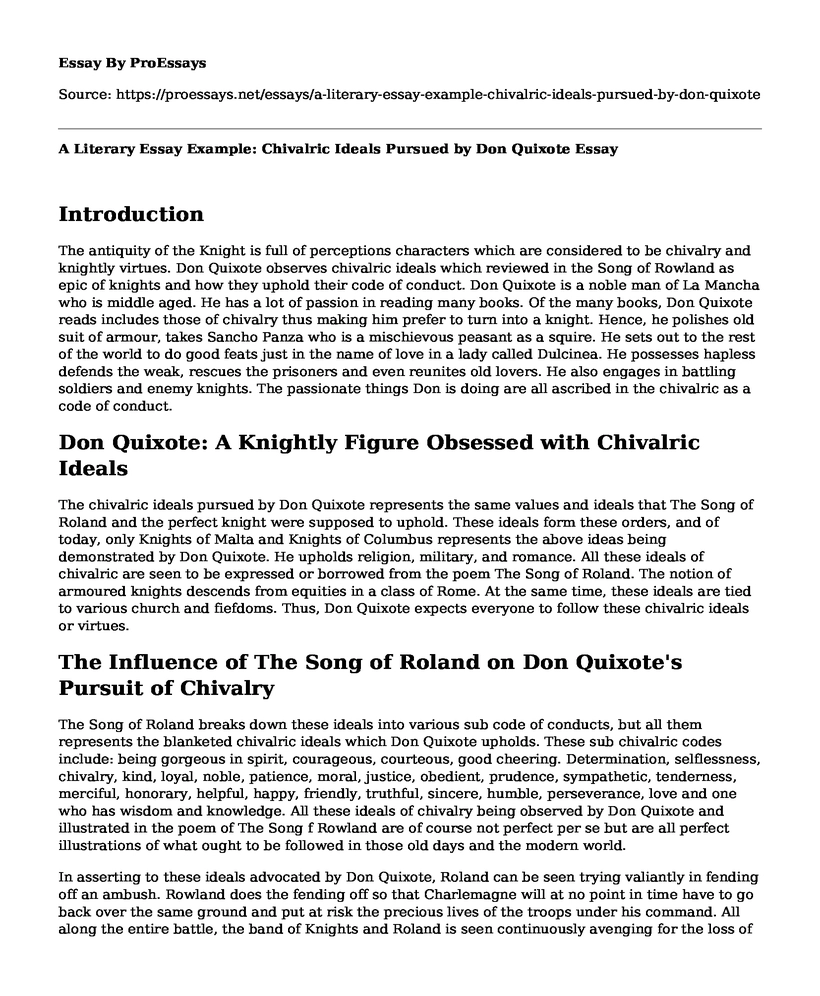Introduction
The antiquity of the Knight is full of perceptions characters which are considered to be chivalry and knightly virtues. Don Quixote observes chivalric ideals which reviewed in the Song of Rowland as epic of knights and how they uphold their code of conduct. Don Quixote is a noble man of La Mancha who is middle aged. He has a lot of passion in reading many books. Of the many books, Don Quixote reads includes those of chivalry thus making him prefer to turn into a knight. Hence, he polishes old suit of armour, takes Sancho Panza who is a mischievous peasant as a squire. He sets out to the rest of the world to do good feats just in the name of love in a lady called Dulcinea. He possesses hapless defends the weak, rescues the prisoners and even reunites old lovers. He also engages in battling soldiers and enemy knights. The passionate things Don is doing are all ascribed in the chivalric as a code of conduct.
Don Quixote: A Knightly Figure Obsessed with Chivalric Ideals
The chivalric ideals pursued by Don Quixote represents the same values and ideals that The Song of Roland and the perfect knight were supposed to uphold. These ideals form these orders, and of today, only Knights of Malta and Knights of Columbus represents the above ideas being demonstrated by Don Quixote. He upholds religion, military, and romance. All these ideals of chivalric are seen to be expressed or borrowed from the poem The Song of Roland. The notion of armoured knights descends from equities in a class of Rome. At the same time, these ideals are tied to various church and fiefdoms. Thus, Don Quixote expects everyone to follow these chivalric ideals or virtues.
The Influence of The Song of Roland on Don Quixote's Pursuit of Chivalry
The Song of Roland breaks down these ideals into various sub code of conducts, but all them represents the blanketed chivalric ideals which Don Quixote upholds. These sub chivalric codes include: being gorgeous in spirit, courageous, courteous, good cheering. Determination, selflessness, chivalry, kind, loyal, noble, patience, moral, justice, obedient, prudence, sympathetic, tenderness, merciful, honorary, helpful, happy, friendly, truthful, sincere, humble, perseverance, love and one who has wisdom and knowledge. All these ideals of chivalry being observed by Don Quixote and illustrated in the poem of The Song f Rowland are of course not perfect per se but are all perfect illustrations of what ought to be followed in those old days and the modern world.
In asserting to these ideals advocated by Don Quixote, Roland can be seen trying valiantly in fending off an ambush. Rowland does the fending off so that Charlemagne will at no point in time have to go back over the same ground and put at risk the precious lives of the troops under his command. All along the entire battle, the band of Knights and Roland is seen continuously avenging for the loss of their fellow group lives of fallen troops of their battalion. They harmoniously and in unity stay together and keep on the fight to try in salvaging and saving one another during the entire period of their fighting. Thus, this act of saving one another's life is a show of faithfulness to one another. At the same time, they exhibit loyalty to the code of chivalric. Their selflessness, nobility, and sympathy to one another during the times of war during the war can testify what Don Quixote upholds and is a believer of in his chivalric ideals. Not only of the high ideals, but they also expressed courage, determination to save one another, justice amongst themselves, obedient in obeying the chain of command from their leaders, prudence, helpfulness, perseverance, and tenderness in their fight.
Don Quixote's Perception of Chivalry: Righteousness and Brevity
More instances in The Song of Roland that depicts the ideals of chivalric that Don Quixote ascribes to is when Ganelon is on trial. Thierry who they have been together for a long time comes to defend him as a show of justice to him which is also a tenet of ideals of chivalric. Thierry stands up for Ganelon as a show of solidarity for his fellow battalion of mate and to what he feels is right and justice to all the military. Through Ganelon acts, he shows thus his loyalty to the army and also to Roland, Charlemagne hence being seen to be truthful. As time elapses, Ganelon proceeds fight Pinabel and defeat him in combat. All these acts show some aspects of righteousness and brevity in what he does. Equally, all these elements enshrined by this soldier are what Don Quixote views as ideals of chivalric.
Conclusion
In conclusion, The Song of Roland intrinsically is an epic of all values embodied by ideals of chivalric of Don Quixote. Humility, nobility, bravery and loyalty characterize the ideals of chivalric demonstrated in The Song of Roland which is in use by Don Quixote.
Reference
In Puchner, M., In Akbari, S. C., In Denecke, W., In Fuchs, B., In Levine, C., In Lewis, P., & In Wilson, E. (2014). The Norton Anthology of Western Literature: Volume 1.
Cite this page
A Literary Essay Example: Chivalric Ideals Pursued by Don Quixote. (2021, Apr 02). Retrieved from https://proessays.net/essays/a-literary-essay-example-chivalric-ideals-pursued-by-don-quixote
If you are the original author of this essay and no longer wish to have it published on the ProEssays website, please click below to request its removal:
- Major Roles of Settings in Worn Path and The Thing They Carried
- Double-Take: A Memoir by Kevin Connolly Paper Example
- Difference Between Ethan Frome's Movie and Book
- Essay Example on African American Literature: Then vs Now
- Essay Example on Climbing the Second Mountain: A Guide to Living a Meaningful Life
- Essay Example on Aesir-Vanir War: Ancient Conflict of Norse Deities
- Leda's Pain: Lucille Clifton's Poetic Exploration of Abandonment - Essay Sample







